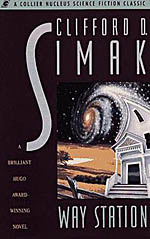
![]() ThomasBa2
ThomasBa2
12/20/2012
![]()
Science-fiction master Robert Heinlein might have been expert at predicting the future when it came to waterbeds and presidents' wives influencing matters of state via astrology, but some of his ideas about the genre he wrote in haven't stood the test of time. Few today, for instance, would agree with his declaration: "to read science-fiction is to read (Clifford) Simak. The reader who does not like Simak stories does not like science-fiction at all."
Back in 1977, Simak was appointed the third SF "Grandmaster" by the SFWA. Now, in the US, all of his books seem to be out of print. I had to pick up my copy of Way Station on Amazon.
Worse still, his influence also seems to be waning. Simak was best known as the pioneer and finest exponent of "pastoral science-fiction", one of the many genres sheltering under the SF umbrella. Perhaps someone better informed can tell me otherwise, but there don't seem to be many direct followers of this strand today. On the evidence of Way Station, that's a pity.
A detailed (and only slightly boring) explanation of the meaning and import of "pastoral science-fiction" can be found on Wikipedia, but most of what you need to know is contained in its self-explanatory moniker: this is sci-fi set in the countryside. In the case of Way Station, the bucolics are centred around backwoods Wisconsin in the early 1960s. There, Enoch Wallace, a Union Army veteran of the 1863 battle of Gettysburg, has been living for more than 100 years. Although he leads a quiet life in an isolated farmhouse, his great age eventually catches the attention of the intelligence services – especially since he doesn't look a day over 30.
The answer to the mystery is – naturally – that Enoch's farmhouse has been turned into a way station for intergalactic travellers, and Enoch's youth is preserved by the same alien technology that seals the building off from the rest of the world and has made its outer surface "so slick and smooth that dust could not cling upon its surface, nor weather stain it".
Simak does an excellent job of setting up this scenario. The tenderly described rural backdrop provides a pleasing contrast to the mandatory enthusing over space travel and mad alien science, and there are evocative descriptions of Enoch's 1860s lifestyle, his quiet woodland retreat and careful brewing of coffee in an old metal pot on the stove while surrounded by technologically advanced gifts from alien visitors.
Less impressive is the story itself. This is a pulpy quest to protect the future of intelligent life on Earth from "the Galactic Council" after it becomes clear that humans have "failed lamentably" and are about to blow themselves up and destroy their planet anyway. Things trail off, after a smart opening full of intrigue about government agents, intergalactic diplomatic machinations and enjoyable encounters with unpleasant, moonshine-drinking humans alongside sophisticated friendly aliens. By the conclusion, the Earth's fate is left in the hands of an idiot savant girl from the backwoods who has the ability to mend butterfly wings and to save the universe with a long-lost object called The Talisman. An object which an intergalactic assassin has brought on to the planet while on the way to kill Enoch. And if that sounds silly, well, that's because it is.
Fortunately, this is one of those books where the substance triumphs over the style. Way Station remains interesting in spite of its clunky plot and many passages of painfully wooden dialogue. Partly that's attributable to the historical curiosity of all that 1960s nuclear paranoia, but mostly it's because Simak's ideas are so sharp and his writing so warm. Intellectually, he makes great play of all the communication issues that Enoch must overcome to look after his way station; for instance, there's some tough philosophy about the human drive to violence and plenty of fun conceits like the threat that mankind will be "dumbed down" by the Galactic Council. (The idea is that they will invoke mass amnesia, leaving the earthlings surrounded by machines they no longer know how to use.) Emotionally, too, all those loving descriptions of coffee and the countryside give real edge to the apocalyptic fear running through the book. Ultimately, Way Station is as moving and as stimulating as it is absurd.